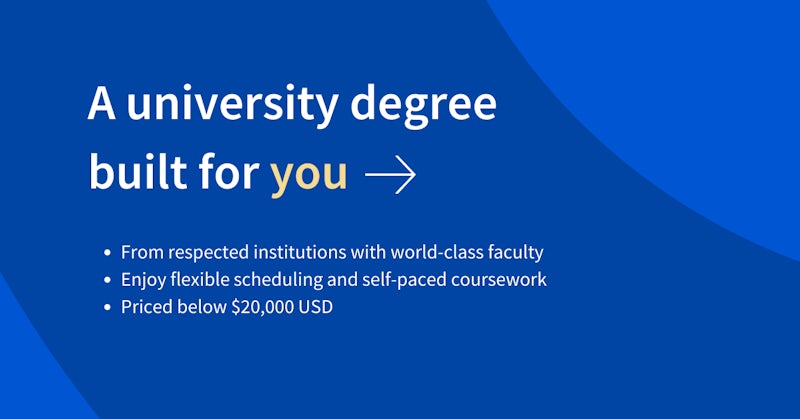![[Feature Image] A learner researches Master of Data Science salaries on their laptop as they plan their educational pathway.](https://images.ctfassets.net/wp1lcwdav1p1/4oGHV1Y9H6LKaNG0Vo3naW/40ac534733f7e2b93b4c0cc883f30989/GettyImages-877026276.jpg?w=330&h=216&q=60&fit=fill&f=faces&fm=jpg&fl=progressive)
Master of Data Science Salaries: 2025 Guide
Data science professionals continue to be in demand. Learn more about the type of salary you may be able to earn after graduating with your master's in data science.
January 26, 2023
Article
Earning a degree can be a rewarding way to deepen your knowledge, develop key job skills, and increase your career opportunities. With these resources, you can make the best choice for you and your unique educational journey.

Explore degrees from top universities

University of Michigan
Skills you'll gain: Data Ethics, Database Design, Reinforcement Learning, Supervised Learning, Data Visualization, Experimentation, PySpark, Interactive Data Visualization, Generative AI, Pandas (Python Package), Network Analysis, Deep Learning, Cloud Services, Natural Language Processing, JSON, Data Mining, Qualitative Research, Applied Machine Learning, Statistical Visualization, Unsupervised Learning
Earn a degree
Degree · 1 - 4 Years

University of Illinois at Urbana-Champaign
Skills you'll gain: Data Visualization, Data Storytelling, Management Accounting, Fund Accounting, Operations Management, Mergers & Acquisitions, Financial Statement Analysis, Marketing, Risk Management, Machine Learning Algorithms, Extract, Transform, Load, Business Strategy, Financial Auditing, Descriptive Statistics, Process Improvement, Marketing Analytics, Generative AI, Financial Market, Strategic Decision-Making, Corporate Tax
Earn a degree
Degree · 1 - 4 Years

Illinois Institute of Technology
Skills you'll gain:
Earn a degree
Degree · 1 - 4 Years
Taking the next step in your education is a powerful investment in your future. Consider undergraduate options or graduate programs designed to advance your career, with the information you need to make confident and informed decisions.
Explore degrees by level—Learn the differences between bachelor’s, master’s, and professional degrees, and find the right fit for your goals.
Discover degrees by subject—Compare programs across fields like business, computer science, and health to see what aligns with your interests.
Get general degree advice—Find answers to common questions about choosing, applying, and succeeding in online degree programs.
Looking for the right degree? Find accredited online degree programs on Coursera tailored to your goals.
That depends on the degree you’re interested in. Many bachelor’s degrees on Coursera from accredited U.S. universities, like Georgetown University’s Bachelor of Arts in Liberal Studies, allow you to transfer college credits you’ve already earned. Some programs, such as the University of North Texas’ Bachelor of Applied Arts and Sciences and Bachelor of Science in General Business, are designed as degree completion programs and require transfer credits for enrollment.
Each university sets its own policies on how many transfer credits can be applied toward degree requirements. Be sure to review the specific transfer credit policies of the program you’re interested in.
You can also start building credits by taking university-approved courses, specializations, and certificates on Coursera. If you apply and are later admitted into a degree program, these completed courses may count toward your degree.
Typically, a bachelor’s degree is required to pursue a master’s degree, but it doesn’t have to be in the same subject or field. Many programs welcome students from diverse academic backgrounds.
Some master’s programs on Coursera don’t require a bachelor’s degree for admission. For example, the University of Colorado Boulder offers performance-based admission for its Master of Science in Electrical Engineering, Master of Engineering in Engineering Management, and Master of Science in Data Science programs, allowing you to qualify through demonstrated skills and experience.
Degree programs on Coursera are designed with flexibility in mind, allowing you to study part-time or full-time based on your schedule.
Undergraduate degrees typically take between two and six years to complete. Your timeline depends on factors like how many transfer credits you bring and the program’s structure. For example, BITS Pilani suggests about 25 hours of study per week, while the University of London recommends around 28 hours weekly.
Graduate degrees generally require one to three years, depending on your pace and program requirements.
Many professional careers require a master’s degree as a minimum qualification. These include roles like physical therapists, nurse practitioners, architects, clinical psychologists, and certified public accountants.
Other fields that often require a master’s degree are audiology, school administration, genetic counseling, postsecondary education, social work, marriage counseling, librarianship, and archaeology.
